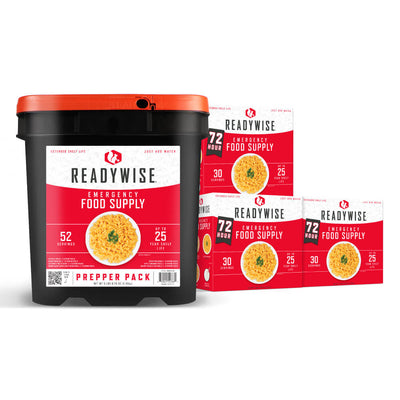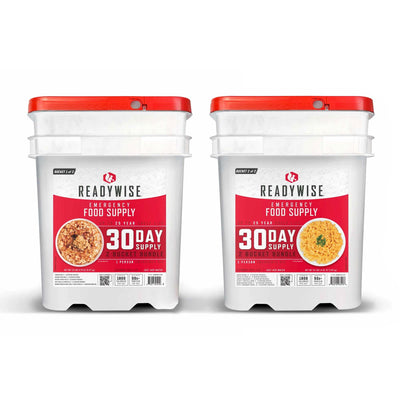How much food should I store for an emergency?
This is a question customers ask all the time and in light of the disasters of 2013, we’ve changed how we answer. As we mentioned last week, you’ll want to carefully determine your calorie needs as you make your emergency plan. The first step is to consider what kind of emergencies are most likely to happen in your area and what other kind of emergencies you want to prepare for. Exploring different emergency food storage ideas can help tailor your preparations to your specific needs. Current Red Cross guidelines advise people to store at least three days of non-perishable food and water, and this is been their longtime standard. Each year we wait to see if they will increase that minimum to a week, and we think they should. Emergency preparedness is about planning ahead, and having the right amount of long term food storage is key.
Short Emergencies: Our Minimum Recommendations
In the last couple of years we've seen so many instances of unexpected, prolonged power outages and water supply contamination that this year we’ve updated our recommendation to encourage people to store at least seven days of food and water for each family member and pet (please don't forget to plan for your pets; many of our customers who have survived outages and disasters say they now keep a month supply of canned or dry food and necessary medications in reserve).
Though it's hard for most of us to believe in the modern era, severe weather can cause outages of a week or more, and it's happened quite frequently in the very recent past. Whichever brands and types of food you store should be shelf-stable, packaged in waterproof and airtight containers, nutritious and shouldn’t require cooking. That’s a pretty short list of food, and you’re going to get sick of peanut butter and canned tuna really fast if you don’t investigate other options. Our ready-to-eat freeze-dried meals offer variety, a long shelf life, and can even be prepared with cold water.
Tailoring Your Food Storage to Special Dietary Needs
When preparing for emergencies, it’s not just about having enough food—it’s also about having the right food. Special dietary needs or restrictions within your household must be factored into your emergency food supply to ensure everyone stays healthy and comfortable during a crisis.
- Allergies – Make sure your emergency food storage is free of any allergens that affect your family members. For example, if someone is allergic to nuts or gluten, look for specifically labeled allergen-free products.
- Medical Conditions – Conditions like diabetes, heart disease, or hypertension may require low-sugar or low-sodium foods. It's important to select emergency meals that align with these needs.
- Dietary Preferences – If anyone in your family is vegetarian, vegan, or follows other dietary preferences, ensure your food storage includes appropriate options. Many freeze-dried meals now come in these varieties.
- Supplements and Medications – In addition to food, consider any essential supplements or medications. Make sure you have enough in storage space to last for the duration of the emergency.
Will you be a Good Samaritan?
The other thing we've learned from experience is that most people are inclined to help their neighbors. Most people will share whatever they have to help others come through an emergency. If you’ll be checking on neighbors, especially elderly neighbors or others who may be more at risk, we recommend storing enough food for at least one "extra" family member. The same goes for pets. So many of our customers report sharing their pet’s food with displaced animals or their neighbors’ pets in an emergency that we recommend keeping extra on hand. Many people feel a moral obligation to help others, but there is good psychology behind it. In disaster most of us want to do something. It gives us a sense of control and boosts our optimism. Sharing food is an easy way to contribute.
Rotation and Expiration: Keeping Your Emergency Food Fresh
Even the best-stocked emergency kit can go to waste if the food expires before you use it. Regularly rotating your supplies ensures everything stays fresh and ready when you need it.
- Check Expiration Dates – Regularly check the expiration dates on your stored food, especially for items like canned goods or store-bought snacks. We recommend doing this every six months.
- First-In, First-Out (FIFO) Method – Organize your food storage so the items with the shortest shelf life are used first. This way, nothing goes to waste, and you always have fresh supplies.
- Replace Expiring Items – As food nears its expiration date, replace it with new items. This is especially important for items that have a shorter shelf life compared to freeze-dried or dehydrated foods.
- Make a Schedule – Set a reminder every six months to check your food storage, rotate items, and replenish anything that’s expired or running low.
Long-term Emergencies and Life Changes
Hurricanes Katrina and Sandy drove home the fact that some disasters are so massive it can more than a week for emergency responders to reach hard-hit areas, and it can take months for even basic supply chains to recover. If you are in an urban area or a high-risk geographic zone, we recommend you store one to three months of food and invest in a high quality water purifier. Of course, individuals and families who store six months or more of food safety have a significantly higher peace of mind that they will be able to endure any emergency.
The last scenario to consider is how would you and your family survive if our society was disrupted by a war or a pandemic? There are a lot of interesting TV shows based on these futuristic scenarios, but you don't have to look far back in history to see that it's actually happened more than once. In his book The Great Influenza, John Barry details how history's most lethal influenza virus swept the globe killing 100 million people in less than six weeks. The book outlines a chain of events that we would likely see repeated, even with advanced modern medicine and technology. When a virus is able to mutate and spread so quickly, emergency response networks are quickly overwhelmed, hospitals are filled, and society as we know it can change overnight.
We're not alarmists, but we are realists. If you're concerned about these kinds of scenarios, we recommend you store a years worth of food for each member of your family. Our dehydrated meals have up to a 25-year shelf life, so you don't have to worry about rotating food or your investment spoiling. And, a year's worth of food is an important safety net as you establish a self-sustaining food production cycle.
Be Prepared for Anything
Emergencies can strike without warning, and having the right amount of food and supplies can make all the difference for you and your loved ones. By assessing your specific needs—including dietary requirements, the potential to help neighbors, and planning for both short-term and long-term scenarios—you'll be better equipped to handle whatever comes your way. Remember, emergency preparedness isn't about fear; it's about peace of mind and taking proactive steps to ensure safety.
Ready to enhance your emergency preparedness plan? Explore our range of long term meals and emergency supplies today. Take the first step toward securing your family's well-being in any situation.


















































































In my opinion, the 3 basic needs for survival is good, water and shelter. After we stored a years worth of dehydrated foods, we had a water well dug in the back yard and bought both hand pump and electric pumps. We then added solar panels a.nd lithium batteries to run the well in case we lose electricity. Now we have met our 3 basic needs. We then began working on conveniences such as a stone fire pit with extra firewood. Several butane bottles of gas and a cast iron camping cook stove. Once we we’re satisfied with our conveniences, we started changing paper money into precious metals (mostly silver). Since we were converting for an insurance policy and not as an investment, we converted mostly to silver troy ounce coins for easy exchange. We are now comfortable but are still looking for ways to improve. We hope this helps others on your way to preparedness. Thanks 🙂